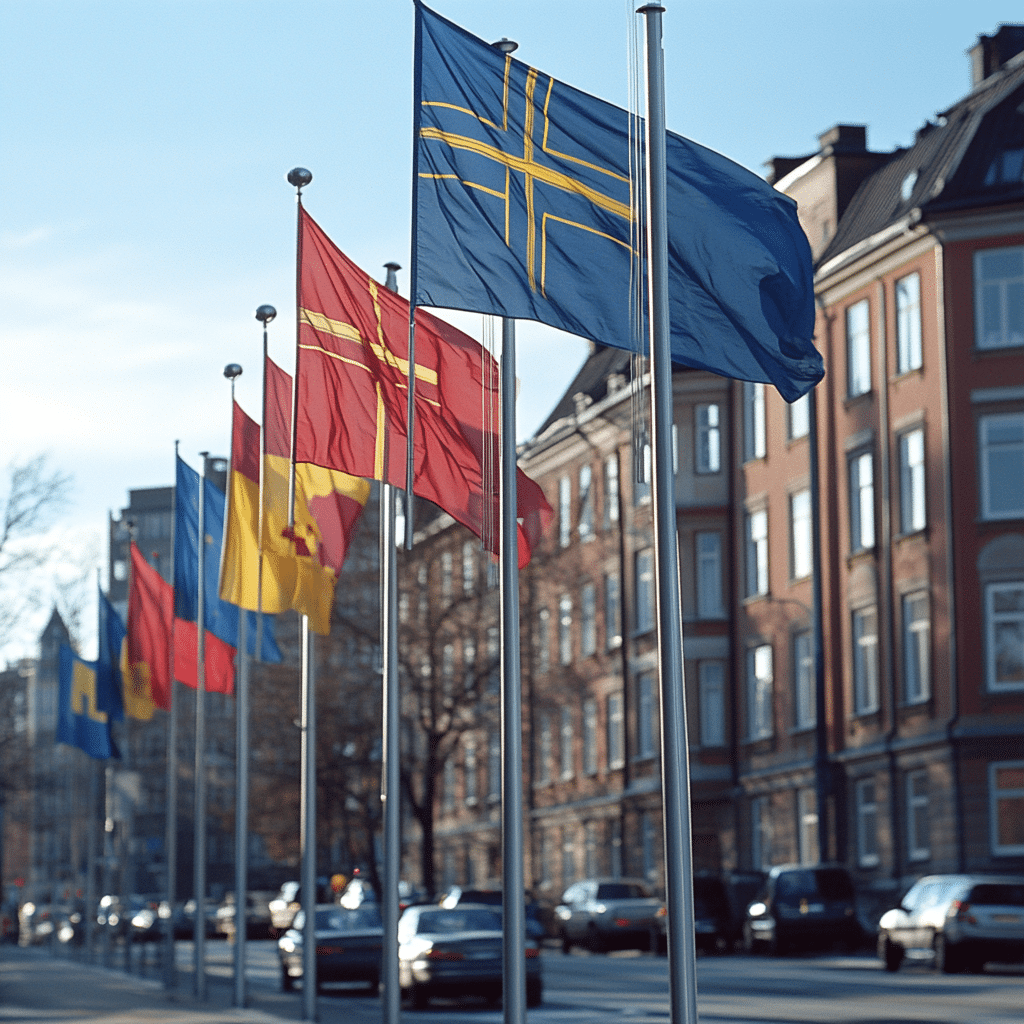In recent months, the idea of Sweden pursuing NATO membership has become a hot topic, igniting a lively discussion about security in Europe. Sweden’s NATO aspirations signal a shift in its long-standing tradition of military neutrality. As geopolitical tensions rise, particularly due to Russia’s assertive actions, the prospect of Sweden NATO membership could reshape the entire landscape of European security. Let’s dive deeper into this transformative moment in history.

Historical Context of Sweden and NATO
Sweden has navigated a carefully balanced relationship with NATO, steeped in its historical commitment to neutrality. Post-World War II, Sweden adopted a non-aligned approach, favoring diplomatic solutions over military alliances. However, this approach didn’t mean isolation; Sweden participated in joint military exercises with NATO members and engaged in various international missions.
The Cold War introduced a sense of urgency, leading Sweden to strengthen its defense forces and further cooperate with NATO through initiatives like the Partnership for Peace program. Fast forward to recent years, and the dynamics have changed drastically. Russia’s aggressive maneuvers, especially during the annexation of Crimea and the ongoing conflict in Ukraine, forced Sweden to rethink its defense strategy. The fear of an incursion into the Baltic region has propelled serious discussions about Sweden NATO membership into the public domain.
Recent history shows that a shift in security policy can follow closely on the heels of evolving threats. The Russia-Ukraine conflict serves as a case in point, reigniting fears and driving Sweden to consider the security provided by NATO’s collective defense mechanism. This is no longer just theoretical; Sweden’s aspirations could very well serve as a crucial turning point for national and regional security.

Sweden’s NATO Membership Application: Top 5 Impacts on European Security
Sweden’s NATO membership application isn’t just a national matter; it’s poised to impact the security landscape across Europe. Here are five significant implications:
If Sweden joins NATO, it’ll bolster the alliance’s defensive presence in the Baltic Sea. This factor complicates any potential military calculations by Russia, as it would face a united front rather than isolated nations.
Sweden’s entry into NATO could activate deeper cooperation among Nordic and Baltic states. Coordinated intelligence sharing and joint military exercises will likely enhance a collective defense capability in Northern Europe, thereby presenting a more formidable barrier against threats.
The shift towards NATO may push other nations in Europe to ramp up their military budgets. Many countries, already grappling with security anxieties from Russian behavior, might feel compelled to meet NATO’s defense spending target of 2% of GDP, raising the stakes in regional defenses.
Sweden’s potential NATO membership raises questions about traditional notions of neutrality. Countries like Switzerland and Austria might reconsider their position if their neighbor shifts away from non-alignment. This could be a precursor to broader changes in Europe’s security strategies.
Joining NATO would provide Sweden with significant security guarantees via Article 5. This guarantee strengthens Sweden’s defense against external threats and may also sway non-aligned countries to reassess their stances towards formal alliances.
The Public and Political Response in Sweden
The Swedish public and political parties have expressed a wide array of opinions on the NATO application, signaling a notable shift in sentiment. Political support has emerged across the spectrum, from the Social Democrats to the Moderate Party, showcasing a growing consensus. Surveys reveal that over 60% of the Swedish population now favor NATO membership, a response driven largely by heightened fears regarding Russia.
The media plays a crucial role in shaping public perception about Sweden NATO, often highlighting security risks while discussing potential benefits. Articles and editorials have explored the pros and cons, leading to more informed public debates. The prevailing sentiment appears to advocate for collaboration over isolation, highlighting Sweden’s desire for a robust security posture.
The urgency is palpable as regional dynamics shift, with allies watching closely. The increasing public discourse on this topic signals an environment where defense and security are finally at the forefront. The debate around Sweden’s NATO membership reflects a Europe wrestling with its approach to both traditional values of neutrality and the modern necessities of defense.
Challenges Facing Sweden’s NATO Membership
Sweden’s journey towards NATO membership is not without hurdles. Several complex challenges lie ahead:
Turkey has voiced reservations about Sweden joining NATO, primarily pointing to concerns over Kurdish groups that it designates as terrorists. These diplomatic roadblocks complicate the membership process, testing Sweden’s diplomatic skills.
Sweden must realign its military and civil structures to meet NATO standards. This transition may involve significant changes in defense policy and reallocating resources to achieve compatibility with NATO protocols.
Countries nearby may display mixed reactions to Sweden’s NATO application. While some may welcome increased security cooperation, others may perceive this as an escalation, raising regional tensions and altering current defense postures.
Looking Ahead: The Future of Sweden in NATO and European Security Architecture
As we progress through a rapidly changing geopolitical landscape, Sweden’s NATO membership is set to be a pivotal point for European security. The ongoing application process will capture attention not just within Sweden but across Europe, as the ramifications could extend far beyond Stockholm.
European security strategies may evolve with Sweden’s integration into NATO, possibly leading other countries to reconsider their defense policies. This could result in bolstered alliances and renewed collaborative efforts to address emerging threats.
Sweden NATO serves as a litmus test for European unity, revealing how nations will work together to face external pressures. The ongoing dialogue surrounding this shift may pave the way towards a more organized and responsive security framework that can withstand tomorrow’s challenges.
An Evolving Security Paradigm
In summary, Sweden’s pursuit of NATO membership stands as a momentous juncture not just for its national security, but for the collective architecture of defense across Europe. As the continent grapples with rising tensions and shifting alliances, the conversation surrounding Sweden’s NATO aspirations will undoubtedly influence political, military, and economic landscapes for the years to come. The way forward will likely offer valuable lessons on how Europe adapts to an unpredictable future, as well as redefine conventional views on security and cooperation.
Sweden NATO: Unpacking the Debate
The Interesting Dynamics of Sweden’s NATO Transformation
Sweden has been on a fascinating journey, particularly as it considers joining NATO. This shift marks a significant pivot in its long-standing policy of military non-alignment. Surprisingly, Sweden has a vibrant history in peacekeeping and diplomacy, yet now it faces the prospect of taking on a more defensive and strategic role within the alliance. Speaking of transformations, did you know that the Boston Standard reported on Sweden’s potential upgrade in military technology to boost defense capabilities? It’s a game-changer as the country aligns with NATO protocols.
In a fun twist, Sweden’s defense readiness took inspiration from unexpected places, including various sports dynamics, such as the real madrid vs ud las palmas standings in strategic planning and competition. The country’s military strategies may now resist the lure of neutrality, turning towards alliances that strengthen its position in Europe. This move grabs attention as it intertwines with its unique culture, which boasts quirky traditions, including the rather outrageous lore about public nudity that could easily be debated among fans during events like those infamous nipple slips in WWE!
The Intersection of Security and Society
Another fascinating aspect about Sweden’s potential NATO membership is how it reflects broader societal shifts. As public interest grows, surveys suggest varying opinions on NATO’s role in their lives. It’s akin to navigating the world of sexual meetups, where perspectives differ yet play a crucial part in shaping future engagements. Sweden’s growth in military cooperation, thus, isn’t just a national issue but a societal conversation that resonates through many layers of its population.
Interestingly, a lot of this drive toward security stems from historical circumstances. Take, for instance, the peculiar journey of the Bairdi crab — it thrives under specific conditions, much like Sweden’s defense measures, which must adapt navigably to an evolving security landscape. As this debate intensifies, Swedes may find themselves reflecting on longstanding values, reminding us of pop culture phenomena like The Pledge Cast, which sometimes echo themes of loyalty and commitment. Thus, in contemplating Sweden NATO, we aren’t just discussing geography and alliances; we’re delving into a narrative that’s both historical and contemporary.




